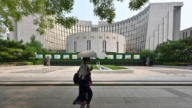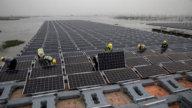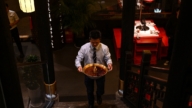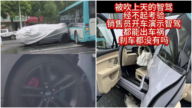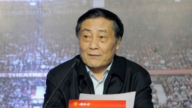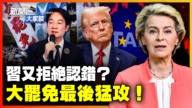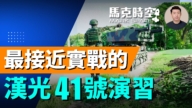【新唐人2014年11月25日讯】中国人民银行宣布,11月22号开始,降低人民币贷款和存款利率,不过中共当局这一罕见举动,并没有给外界带来惊喜。专家认为,中国经济持续放缓给中共带来了实际压力,为了实现好看的经济增长数据,中共被迫降低利率,不过由于中国的政经体制都已经烂的不可收拾,贷款者把钱拿走后并不会投入实体经济。而一旦开闸降息,后续造成的通货膨胀将更加稀释民众资产,加速中共灭亡。
中国人民银行宣布,从22号开始,下调人民币贷款和存款基准利率。一年期贷款基准利率下调0.4个百分点,降至5.6%﹔一年期存款基准利率下调0.25个百分点,降至2.75%,同时将存款利率浮动区间的上限,由存款基准利率的1.1倍调整为1.2倍﹔其他各档次贷款和存款基准利率也相应调整。
美国《华尔街日报》指出,央行的降息举措,是迫于政治和市场压力做出的决定,意味着央行承认,此前为提振疲软经济采取的零星举措并没有奏效。不过,因为市场低迷,降低贷款利率也不能保证借款人有借贷意愿。
大陆《新浪财经》评论说,降息对商业银行是最大的利空,甚至可以说是“致命性”的打击。
旅美经济评论家马杰森:“贷款利息降低比较多,降息的目的是想从刺激实体经济方向走,而不是把钱从银行逼出来刺激消费。它一旦第一次降息,那以后降息就可能变为一个常规的调整手段了,它一步一步往下走我们再看,但至少可以看到目前经济放缓,中共自己也在担心。”
在采取这一次降息之前,中共央行已经采取了一系列小规模宽松措施,不过,《华尔街日报》指出,这些措施并没有能促进银行的放贷和企业的借贷意愿。
11月6号,央行也承认通过所谓的中长期借贷工具,已经注入7,695亿元到中国各银行,包括9月份注入的5,000亿元,和10月份注入的2,695亿元。
大陆企业观察员何军樵:“这个钱要么就出逃了,要么就拿去还债了,基本上没有拿去再生产,降息基本上没什么大的的用处,对老百姓来说,不是什么好事,通货膨胀马上就会加剧。捞钱的捞钱,逃跑的逃跑,外流的外流,老百姓最多就弄点工资钱,就看中国老百姓的忍受程度和政府的维稳能力。”
《新浪财经》专栏作家余丰慧认为,降息引发管制利率与市场化融资价格差距拉大,只能导致银行体系里的资金流向民间高利贷市场和房地产市场,从而造成企业融资成本更高。同时,由于降息拉大了中国和美国的利差,会导致热钱流出加剧,使得国内流动性资金更加趋紧,甚至出现热钱撤离导致的金融风险。
何军樵:“大家都在往银行里捞钱,捞不到钱他就会向社会融资,通过各种手段,无论政府还是民间,银行都在进行融资,其实很多企业已经资不抵债,大家都在靠这个杠杆在活着,所以现在金融、制造业,包括房地产实际上都是一个庞氏骗局。”
大陆财经评论家牛刀:“大家都干满了就走了,根本不负责任的,这样的债务,可以这么说,本身搞这个的时候就是准备烂债的,他当时借出去这个钱,就不打算让这些人还的,所以整个商业银行都会出问题。”
《新浪财经》指出,这次降息的贷款会流向股市、互联网金融,以及房地产市场。
大陆财经评论家牛刀认为,这次降息完全是为了“救市”,不仅不能刺激经济,还会导致人民币长期的大幅贬值。
牛刀:“钞票印多了以后房地产价格拉的太高,中国共产党在房地产方面拚命的保住,他们还不想把泡沫搞下来,还要人家继续去买房。所以共产党过不了这两年,绝对过不了,它想怎么救都没有用。”
大陆企业观察员何军樵也认为,中共的政治体制和经济体制已经烂的无法救要,任何措施都无法真正解决它所面临的经济难题。
采访编辑/刘惠 后制/舒灿
After Interest Rates are cut, Where will the Money Flow?
The People’s Bank of China announced, from Nov. 22,
the RMB lending and depositing rates decreased,
but this rare move did not surprise the public.
Experts believe that, as China’s economy continually
slows down, it has brought great pressure
upon the Chinese Communist Party (CCP).
In order to achieve a so-called good economic growth data,
the CCP was forced to lower the interest rates.
However, because China’s political and economic system
have become so rotten, it is now impossible to save.
The money lenders will not put the loaned money back
into the real economy.
Once the floodgates to cut interest rates are opened,
subsequent inflation will dilute the assets of the people,
which will accelerate the demise of the CCP.
People’s Bank of China announced, from Nov 22,
the benchmark interest rate of RMB loans and deposits decreased.
One-year benchmark lending rates were cut by 0.4 points
to 5.6 percent; one-year benchmark deposit rates were cut
0.25 points to 2.75 percent,
while the upper limit of floating range deposited interest rates,
was adjusted from the prior 1.1 times of the benchmark, to 1.2 times.
Other benchmark lending and deposit rates
were adjusted accordingly.
United States “Wall Street Journal" said that the decision
of decreasing central bank’s interest rate was forced
due to political and market pressure,
which means Central Bank admits that the prior sporadic initiatives
to boost the weakened economy, did not work.
However, due to the market downturn, lower lending rates
cannot guarantee the borrower can obtain a loan.
China Mainland Sina Financial commented that cutting
the interest rates,
is quite likely to be the worst negative type of news
for commercial banks, even a “fatal" blow.
US-based economic commentator Jason Ma:
“This time the loan interest rate was cut a little more.
The purpose of lowering the interest is to divert
and stimulate the entire economy into the direction
of developing real economy,
instead of forcing to draw out money from the bank to consume.
Once there is a first time cutting of interest rates,
then to cut interest rates might become a regular means
of adjusting the economy.
Let’s see it step by step in the future. But at least it’s seen
that the current economic slowdown makes the CCP worried."
Before cutting the interest rates, the CCP’s Central Bank
has taken a series of small-scale easing measures.
But “Wall Street Journal" believes that these measures
did not promote the lending willingness of banks
and the borrowing willingness of businesses.
On Nov. 6, the Central Bank also acknowledged,
by the so-called long-term lending tools,
a total of 769.5 billion RMB ( US$125 billion) has been injected
into Chinese banks,
including the injection of 500 billion RMB (US$ 81 billion)
in September and 269.5 billion in October.
Mainland enterprises observer Mr He Junqiao:
“This money (lent out from the bank) will either flee away
from China, or be used for paying the debt,
basically the money was not used for
reproduction purposes.
Cutting the interest rates has basically made no difference.
For the ordinary people, cutting the interest rates
is no good thing, because the inflation soon intensifies.
Cutting the interest will allow some people to make lots of money,
some to flee away from China with the money and some
of the money to go outside of China.
The ordinary people just make some money
from their wages at most.
So the final end will depend upon the extent of the people’s
endurance and safeguard stability of the government."
“Sina Financial" columnist Yu Fenghui believes that
cutting the interest rates leads to a much larger gap
between the control of interest rates and the market price,
hence allowing money from the banking system flow into
the non-regulated usury market and real estate market,
resulting in higher financing costs of the enterprises.
At the same time, the interest rate cuts widens
the interest rate gap between China and America,
which leads to an increased outflow of hot money,
tightening domestic liquidity, and even the financial risks
related to the withdrawal of hot money.
He Junqiao: “Everyone is making money from the banks.
If they cannot make money from the banks,
then they raise the money from society by all means.
Whether government owned or private enterprises,
even the banks, they are all financing from society.
In fact, many companies have already become insolvent.
They all sustain themselves by the leverage system.
So now the financial field, manufacturing field and real estate
are all actually a Ponzi scheme."
Mainland Financial critic Niu Dao: “Everyone left once
the term expired.
They are all fundamentally irresponsible for such debts.
So we can speak, when they prepare for the project,
they are ready to engage in this bad debt.
When they lend out the money, they are not going to let the
borrowers repay the debts.
So the entire commercial banks will go awry."
“Sina Financial" indicates that the rate cuts will
drive the loans flowing to the stock exchange market,
Internet banking, and real estate market.
Mainland financial commentator Niu Dao believes that
this rate cut is entirely for the “bailout", however,
this not only cannot stimulate the economy, but also leads
to a sharp depreciation of RMB for the long term.
Niu Dao: “Printing too much banknote leads
to high prices of real estate.
The CCP want desperately to save the property market,
they do not want the bubble bursting,
and even induce the people to continue buying homes.
So the CCP could not sustain the following two years,
absolutely could not sustain over the plight.
Whatever measures they use
for saving the economy, it is no use."
He also believes that the CCP’s political system
and economic system both have been rotten
so indeedt it is impossible to save.
Any measures cannot really solve
the economic problems the CCP are now facing.
Interview & Edit/Liuhui Post-Production/ShuCan


